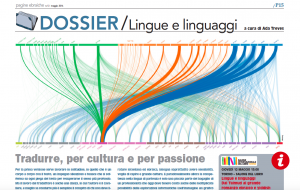CULTURE Books and Translations, a Matter of Passion
The Salone del Libro of Turin, Italy, the biggest and most important international book fair of the country together with the Bologna Children’s Book Fair, will open its doors on the 12th of May, for a twenty-ninth edition that as usual will attract not only the exhibitors but teachers, publishers, booksellers, librarians, agents, illustrators and translators, and a huge quantity of people that simply love books.
This year the theme is “Visions” and – as explained by the president and director – visionaries aiming clearly at the future, in a time when printed pages are having more than some difficulties, but are finally establishing themselves as more than “a thing from the past that is struggling to survive.”
As every year since its very first appearance, that was staged at the Salone del libro in 2009, Pagine Ebraiche will be among the protagonists of the book fair, distributed in thousands of copies all over the place. The Salone will also host two events organized by the newsroom, devoted to translation and translators – as are the special pages of the May issue, titled
“Lingue e linguaggi” – on the opening day and to the Iranian poet Payam Feili on the closing day. Feili, who has been at the center of the big interview of the April issue of Pagine Ebraiche, recounting his experience in Israel, will be interviewed by Daniela Fubini and by the editor in chief of the newsroom Guido Vitale.
We present here the English version of the text that opens “Lingue e linguaggi”.
To translate, a question of passion and culture
The first version is the result of solitary work, in what is a real fight with the words, a silent and tenacious commitment that focuses on every fold of the text to retrieve even the tiniest and deepest sense. But the translator’s work is also a dance, in which the author is the knight, and the better he conducts, the simpler is the task of those who must not only follow, giving word for word the meaning of the original text, but must be able to listen, understand, interpret, and then write in their own language what the author wanted to say. And not only to say, but also what the author was trying to suggest, to whisper, to imply with images, metaphors and sounds, impossible to translate in Italian if you do not know the language very well. A language that must be loved, respected and kept alive reading literature, history, poetry, in a continuous enrichment which then allows to be faithful to the works of writers who some times come from very different worlds. Because to translate very well the knowledge of another language is not enough but, as everyone of the four translators who are responsible for much of how in Italy a good part of the Israeli and Jewish literature is perceived and lived, we must above all have the feeling, and a desire to understand another culture.
Paradoxically then, the competence in the original language is only a small part of the tools of a professional, who must nowadays also take into account the multiplied possibilities of computer explorations (in the image a graph of the cross-references between traditional Jewish texts of Sefaria laboratory).
Professionals have yet to become, instead, the students of the prestigious and selective school for interpreters and translators at the University of Trieste, who completed the training alongside the editorial staff of Italian Jewish Communities Union. But their experience was positive, and proved itself as the starting point of a journey that will continue. The human component of the translation remains essential, despite advances in technology and the latest innovations, and to address the full translation of the fundamental texts of Judaism appears to be only one solution: to work together, making themselves available, each with their own skills.

